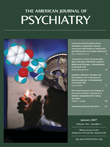Treatment of Acute Posttraumatic Stress Disorder With Brief Cognitive Behavioral Therapy: A Randomized Controlled Trial
Abstract
Objective: The purpose of this study was to evaluate the efficacy of brief cognitive behavioral therapy for patients with acute posttraumatic stress disorder (PTSD) resulting from various types of psychological trauma. Method: The authors randomly assigned 143 patients with acute PTSD (irrespective of the time criterion), within 3 months after experiencing a traumatic incident, to either brief cognitive behavioral therapy (N=79) or a waiting list comparison group (N=64). Cognitive behavioral therapy consisted of four weekly sessions containing education, relaxation exercises, imaginal exposure, in vivo exposure, and cognitive restructuring. Main outcome measure was PTSD score measured by structured interview; secondary outcomes were anxiety and depression measured by questionnaire. Assessments took place before the intervention and 1 week and 4 months after the intervention. Results: Symptoms of PTSD, anxiety, and depression decreased in both groups over time. One week after the intervention, the cognitive behavioral therapy group had significantly fewer symptoms of PTSD than the comparison group, but this difference was smaller and no longer significant 4 months after the intervention. Similar results were found for anxiety and depression scores. Subgroup analyses showed that cognitive behavioral therapy led to significantly lower PTSD scores at 4 months in patients with baseline comorbid major depression and in patients who were included within the first month after the traumatic incident both at 1 week and at 4 months. Conclusions: Brief early cognitive behavioral therapy accelerated recovery from symptoms of acute PTSD but did not influence long-term results. Brief early cognitive behavioral therapy showed enhanced efficacy in patients with baseline comorbid depression and patients who were included within 1 month after their traumatic experience.



